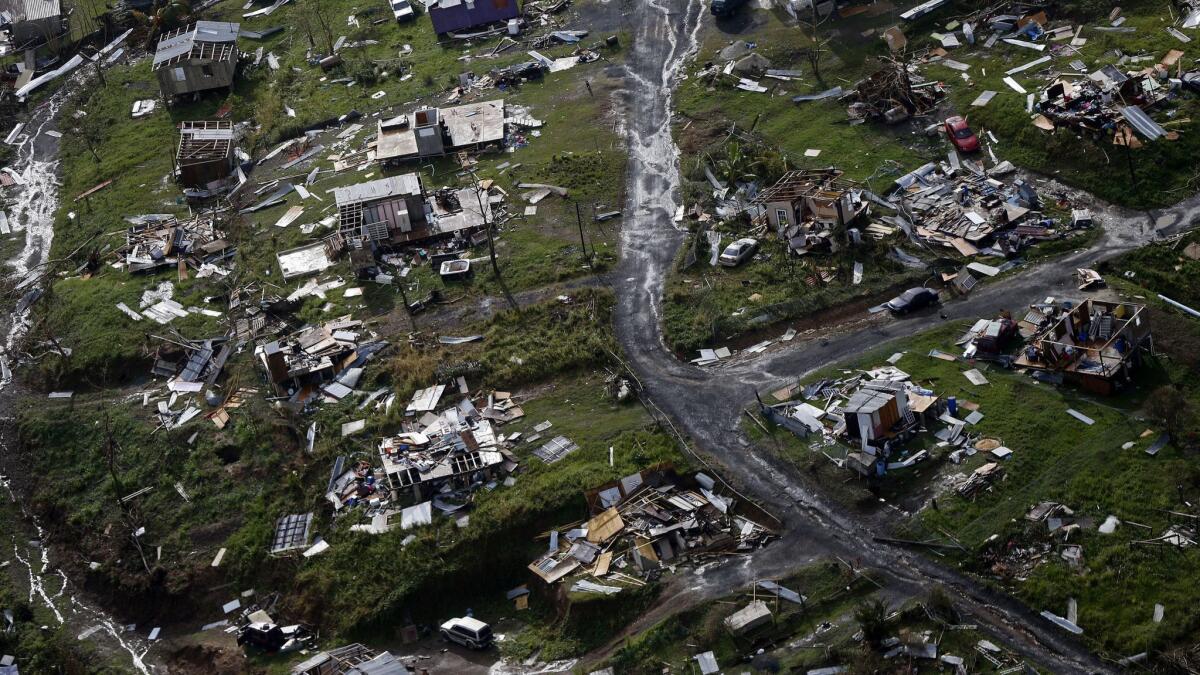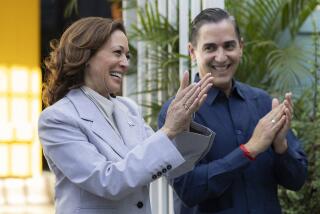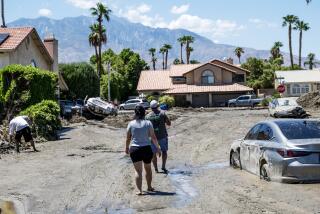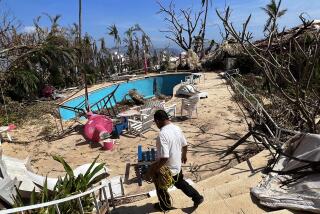Op-Ed: Devastation without representation in Puerto Rico

The 120-year epic tragedy of Puerto Rico can be told as a tale of two hurricanes. The one fresh in our memory is Maria, which reached Puerto Rico a year ago. The other was hurricane San Ciriaco in 1899, which devastated the island just after it became part of the United States.
In 1898, the United States invaded Puerto Rico during the Spanish-American War and annexed it soon afterward. Months later, San Ciriaco slammed the island. Floods raged. Buildings and infrastructure collapsed. Crops were ruined. People starved. The newly installed U.S. governor recounted an “appalling story of death, hunger, and suffering.” After the storm, a quarter of the 1 million residents lacked food or shelter and 3,000 were dead.
For the record:
12:00 p.m. Sept. 20, 2018The Jones Act does not require that all goods entering Puerto Rico seaports be carried by U.S. flagged ships. The law requires that cargo moved between two U.S. ports, including Puerto Rico, be transported by U.S. vessels.
However, because Puerto Rico had just become a U.S. territory, President William McKinley’s administration oversaw a massive relief effort and cast it as a down payment on the benefits of U.S. rule. Soon 32 million pounds of food had been distributed, likely saving up to 100,000 lives. This also allowed the U.S. to blame Spain, which had bequeathed Puerto Rico its fragile infrastructure. McKinley’s secretary of war, Elihu Root, promised the island “more generous and beneficent treatment at our hands.”
This colonial oppression should be intolerable in the United States, a rich democracy born of anticolonial revolt.
That’s not, of course, how it worked out. Instead, Congress passed the Foraker Act of 1900. Under it, Puerto Ricans received no federal voting power, no U.S. citizenship, no extension of full constitutional protections, no fully elected legislature, no role in choosing their governor and certainly no guarantee of eventual statehood.
The U.S. Supreme Court soon declared this conspicuous colonialism constitutional.
This shocking gap between the country’s purported ideals and its treatment of Puerto Rico undermined America’s moral authority around the world. So during World War I, the United States extended citizenship and a fully elected legislature to Puerto Ricans. Still, it wasn’t until after World War II, when decolonization became a global ideal, that the United States granted Puerto Rico home rule, including its own constitution and an elected governor.
Still, Puerto Rico has remained part of the United States, subject to the whims of a U.S. Congress in which it has no vote. That has left it involuntarily dependent on U.S. idealism and good will, and subject to federal neglect and small-mindedness. The Jones Act is one small example. For nearly a century it has subsidized the U.S. merchant marine by requiring that all goods entering Puerto Rico seaports be carried by U.S. flagged ships. Puerto Ricans’ protests that the subsidy is paid from their pockets have been for naught.
The island’s economic development has been similarly subject to federal caprice. Starting in the 1920s, the U.S. government gave corporations tax incentives to invest in Puerto Rico. Predictably, those incentives became the cornerstone of the island’s economy. Congress then withdrew the incentives, and an islandwide recession ensued. Twelve years into it, no end is in sight.
The story of debt adjustment is the same. Congress singularly imposed on Puerto Rico the inability to respond to debt crises. The island was unable to secure a repeal. When its debts ballooned beyond its capacity to pay, there was no way forward. With Washington gridlocked, Puerto Rico enacted its own debt-restructuring law in 2014 — which the U.S. Supreme Court promptly invalidated. By the time Congress stepped in to authorize debt restructuring, the island’s finances were in tatters — where they remain.
This colonial oppression should be intolerable in the United States, a rich democracy born of anticolonial revolt. Puerto Rico deserves better — including the chance to be a state if it chooses. Instead, the injustices have been compounding for more than a century. Compared with other American citizens, those in Puerto Rico earn barely a third as much and are three times more likely to live in poverty. They pay the same Medicare payroll taxes for hardly half as much spending on care. Such outrageous inequities have driven a mass northern migration: About 65% of all Americans of Puerto Rican descent now reside stateside.
Just as San Ciriaco starkly revealed the failings of Spanish rule, Hurricane Maria gave the lie to America’s pretensions of “generous and beneficent treatment.” Once again floods raged. Buildings and infrastructure collapsed. Crops were ruined. Roads became unusable. The fragile electric system gave out and stayed out for almost a year. The hurricane’s death toll has neared 3,000.
Enter the Fray: First takes on the news of the minute from L.A. Times Opinion »
What makes it worse this time is that President Trump has, in effect, finally renounced any promise that U.S. rule will have any material or moral benefits. Without even a single vote in Congress, Puerto Rico lacked leverage to secure adequate federal relief after Hurricane Maria. Food, water, tarps, personnel, helicopters and individual-assistance funds all reached the island much more slowly than they did Texas, which Hurricane Harvey clobbered that same summer. Today, the rapid and massive federal hurricane relief that states receive is on display in the Carolinas.
Puerto Rico remains “the oldest colony in the world” — to borrow the phrase of José Trías Monge, the late chief justice of the Puerto Rico Supreme Court — despite 120 years as part of the world’s oldest surviving democracy. The result is not just discriminatory, but in the face of natural disasters like Hurricane Maria, deadly.
It is time for the U.S. to fulfill its ideals. Absent a constitutional amendment, a newfound appetite among Puerto Ricans for independence, or Supreme Court activism, the only legitimate path is to offer Puerto Rico the option to become a state. Democracy accepts no less.
Sam Erman is an assistant professor at USC and author of “Almost Citizens: Puerto Rico, the U.S. Constitution, and Empire.”
Follow the Opinion section on Twitter @latimesopinionand Facebook
More to Read
A cure for the common opinion
Get thought-provoking perspectives with our weekly newsletter.
You may occasionally receive promotional content from the Los Angeles Times.






